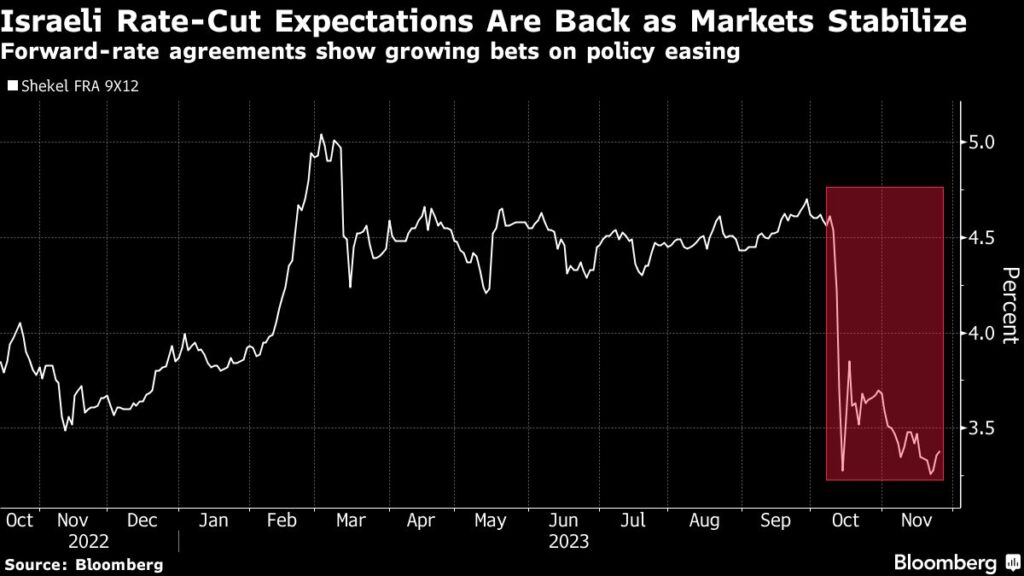(Bloomberg) — Israel’s central bank held borrowing costs unchanged for a fourth straight time as it sets the stage for easing policy after containing the worst of the economic fallout from the war with Hamas.
Most Read from Bloomberg
The monetary committee on Monday left its key interest rate at 4.75%, in line with the forecasts of all economists surveyed by Bloomberg. The shekel traded stronger against the dollar after the announcement.
In a statement accompanying the decision, policymakers repeated almost word-for-word their guidance from last month, saying the focus is on “stabilizing the markets and reducing uncertainty, alongside price stability and supporting economic activity.”
“The interest rate path will be determined in accordance with developments in the war and the uncertainty derived from it,” the central bank said. “Insofar as the recent stability in the financial markets becomes entrenched and the inflation environment continues to moderate toward the target range, monetary policy will be able to focus more on supporting economic activity.”
Israel’s worst armed conflict in half a century has ripped through the economy by paralyzing many businesses, jolting consumer demand and draining the labor market of workers following an Oct. 7 Hamas attack from Gaza that killed 1,200 people.
But following the shekel’s rebound and limited spillovers into inflation from the war so far, JPMorgan Chase & Co. sees the Bank of Israel moving “to policy accommodation earlier than expected.”
Sentiment has reversed sharply since policymakers last met a month ago, when the shekel was enduring its longest run of losses in almost four decades. The course of the war remains hard to predict, however, with a short truce between Israel and Hamas set to end a day after the rate meeting.
“There may be an interest rate reduction at the beginning of next year if the exchange rate stabilizes, but further reductions will depend on US Fed policy,” analysts at Bank Hapoalim’s financial division said in a report said before the announcement. “We expect the interest rate to be approximately 4% in about a year.”
Israel has made clear it wants to continue the war until Hamas, designated a terrorist group by the US and European Union, is destroyed. The Israeli military’s airstrikes and ground offensive on Gaza have killed around 15,000 people, according to the Hamas-run health ministry there.
As the economic damage spreads, the possibility of a rate cut is back now that the shekel appreciated nearly 9% against the dollar since the Bank of Israel’s last meeting on Oct. 23, the world’s best performance in that period.
Worse Outlook
The war has prompted growth downgrades from the central bank and the Finance Ministry, which is raising spending at a steep pace to help pay for a conflict that’s estimated to cost around 200 billion shekels ($54 billion).
The Bank of Israel’s research department on Monday again lowered its growth projection and now expects gross domestic product to expand by 2% this year and next. The debt-to-GDP ratio is estimated at 63% in 2023 and 66% in 2024.
“The forecast features an especially high level of uncertainty, and includes the assessment that government expenditures due to the war will total about 160 billion shekels,” it said.
The decision this week was the first since Amir Yaron’s reappointment as governor for another five-year term. During his stint so far, Yaron has only cut rates once — at the height of the Covid-19 pandemic in 2020 — and has since presided over a record-long cycle of monetary tightening that took borrowing costs to their highest in 17 years.
After the war began, Yaron deployed emergency measures to stabilize markets and previously made clear he’d be sidestepping rate cuts to avoid more pressure on the currency. The shekel’s recent rebound was in large part down to the central bank’s unprecedented interventions that totaled $8.2 billion in October.
Risks around inflation may also prove an obstacle to cutting rates just yet. The outlook is still in flux, though Israel has so far defied some earlier predictions of a price surge.
“This may be an inflection point for inflation, because on the long run, transport difficulties, shortage of raw materials and pressure on the housing market can push prices up. The central bank may choose to wait until there is more certainty that inflation will inch down to its target range of 1-3% before it cuts rates,” says Ori Greenfeld, Chief Strategist at Psagot Investment House.
A debate is also unfolding in Israel over changes to its current budget, with central bank officials recently criticizing the ruling government’s reluctance to scrap outlays on religious programs and West Bank settlements at a time when it’s under pressure to raise funding to finance the war effort.
Israel’s cabinet is scheduled to meet later on Monday to discuss a revised fiscal plan for 2023 that’s set to boost expenditure by 30 billion shekels, much of which will be funded by debt.
Tensions over the special allocations have meanwhile ratcheted up between Prime Minister Benjamin Netanyahu and his political rival, ex-Defense Minister Benny Gantz, who recently formed a national unity government for the duration of the war. Gantz has said that his party would have to “consider its future steps” if the discretionary financing remains in the new budget.
The disagreement could become an obstacle for rate cuts at the start of next year, according to Mizrahi Tefahot Bank’s chief markets economist Ronen Menahem. It signals an unwillingness on the part of the government to change its political priorities in favor of greater fiscal discipline and focus on policies that enhance growth, he said.
–With assistance from Joel Rinneby.
Most Read from Bloomberg Businessweek
©2023 Bloomberg L.P.
Read the full article here

